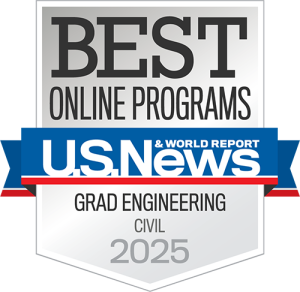
Civil Engineering Program Overview
The Master of Civil Engineering is designed to empower professionals with the cutting-edge knowledge and skills needed to shape the future of our built environment. With the everchanging structural landscape we now live in—our cities are growing, infrastructure is aging, and environmental and social challenges are evolving—we need exceptional engineers to meet these challenge with transformative skills. Our master’s program equips engineers with the advanced knowledge to design, build, and maintain critical structures and infrastructure systems that sustain our world.
With a diverse array of graduate courses, you can specialize in a number of areas within civil engineering or customize a broader curriculum that aligns with your unique career goals. Designed for flexibility, courses are delivered online, in either synchronous or asynchronous formats, with select in-person offerings on the Homewood Campus—ensuring that wherever you are, you can advance your expertise and make a positive impact.

As a student, you will gain a firm understanding of how to:
- Apply mathematics, science, and engineering principles to a variety of civil engineering situations.
- Identify, formulate, and solve complex problems in civil engineering.
- Use the techniques, skills, and modern tools necessary for engineering practice.
Master’s Focus Areas
A focus area can be selected but is not required. Your focus area will not appear on your diploma but will provide a tailored education for students looking to specialize in a specific field.
- Geotechnical Engineering: Study how to apply engineering theory and practice to the environment. Explore topics like ground improvement methods, hydrogeology, and more.
- Natural Hazards Resilience Design
- Ocean and Coastal Engineering: Study how to apply engineering theory and practice to ocean and coastal systems. Explore topics like natural disaster risk modeling, fluid dynamics, and more.
- Preservation Engineering
- Structural Engineering: Study how to apply engineering theory and practice to building and physical structures. Explore topics like bridge design and evaluation, preservation engineering, and more.
FOCUS AREA REQUIREMENTS
Programs
We offer two program options for Civil Engineering: a graduate Civil Engineering Certificate. or a Master of Civil Engineering.
Civil Engineering Courses
Explore course requirements, prerequisites, focus areas, and electives related to civil engineering. All courses are taught by leading subject-matter experts who use and develop the technologies and theories they teach every day. For exact dates, times, locations, fees, and instructors, please refer to the course schedule published each term. Civil engineering online courses, in-person courses, and hybrid courses are available.
Program Contacts
-
 Email:sangree@jhu.edu
Email:sangree@jhu.edu
-
Email:azylins1@jhu.edu
-
 Email:hayley.beach@jhuapl.edu
Email:hayley.beach@jhuapl.edu
“Convenience was key. It’s hard going to school and working full time. I liked how many online classes were offered, I could work them around my schedule. ”
Tuition and Fees
Did you know that 78 percent of our enrolled students’ tuition is covered by employer contribution programs? Find out more about the cost of tuition for prerequisite and program courses and the Dean’s Fellowship.
Why Hopkins?
An online civil engineering master’s from the Education for Professionals program at Johns Hopkins University opens the doors for the next phase of your career. Take your first step today.

Career-Advancing Knowledge - Coursework incorporates industry-specific knowledge that you can use from day one. As a graduate, you will be prepared to advance your career, cross over into other engineering fields, take on leadership roles, and increase your income-earning potential.

Leaders in Online Education for 18+ Years - Civil engineering online courses taught by the Johns Hopkins Engineering for Professionals faculty have nearly two decades of experience behind them. Our experience can make your experience smooth, rewarding, and impactful. Learn More

Build a Better Network - Through the civil engineering program, you’ll have the opportunity to connect with accomplished scientists and engineers in a variety of fields to broaden the possibilities of what you can achieve. Learn More
“I really enjoyed my time in the EP program. It was flexible, I was always able to find a course I could take, and most importantly, I was able to finish my degree while moving from Baltimore to Denver without interruption. I felt that for the most part, the courses were well structured to accommodate working professionals. I rarely felt as if I was in over my head. I feel that this was a great career and professional move and I would recommend it to anyone seeking to further their technical education. ”
Civil Engineering FAQs
Once accepted, you have five years to complete your civil engineering master’s degree. If taking a semester off is necessary for your work or personal life, our online program lets you do so. Flexibility is key to all Engineering for Professional programs.
On average, our Engineering for Professionals civil engineering master’s alumni make upwards of $120,000 after completing their degrees.
Yes, applicants without a degree in Civil Engineering may be accepted to the program provided they demonstrate successful completion of the program’s prerequisites
The Engineering for Professionals program was designed with working professionals in mind. Therefore, we offer both synchronous and asynchronous courses to accommodate your busy schedule.
Academic Calendar
Find out when registration opens, classes start, transcript deadlines and more. Applications are accepted year-round, so you can apply any time.


